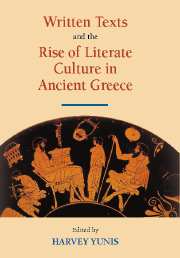Book contents
- Frontmatter
- Contents
- Preface
- Contributors
- Introduction: Why Written Texts?
- 1 From Letters to Literature: Reading the “Song Culture” of Classical Greece
- 2 Writing Religion: Inscribed Texts, Ritual Authority, and the Religious Discourse of the Polis
- 3 Letters of the Law: Written Texts in Archaic Greek Law
- 4 Writing, Law, and Legal Practice in the Athenian Courts
- 5 Literacy and the Charlatan in Ancient Greek Medicine
- 6 Literacy in Greek and Chinese Science: Some Comparative Issues
- 7 Writing Philosophy: Prose and Poetry from Thales to Plato
- 8 Prose Performance Texts: Epideixis and Written Publication in the Late Fifth and Early Fourth Centuries
- 9 Writing for Reading: Thucydides, Plato, and the Emergence of the Critical Reader
- 10 Reflecting on Writing and Culture: Theocritus and the Style of Cultural Change
- Bibliography
- Index
9 - Writing for Reading: Thucydides, Plato, and the Emergence of the Critical Reader
Published online by Cambridge University Press: 30 July 2009
- Frontmatter
- Contents
- Preface
- Contributors
- Introduction: Why Written Texts?
- 1 From Letters to Literature: Reading the “Song Culture” of Classical Greece
- 2 Writing Religion: Inscribed Texts, Ritual Authority, and the Religious Discourse of the Polis
- 3 Letters of the Law: Written Texts in Archaic Greek Law
- 4 Writing, Law, and Legal Practice in the Athenian Courts
- 5 Literacy and the Charlatan in Ancient Greek Medicine
- 6 Literacy in Greek and Chinese Science: Some Comparative Issues
- 7 Writing Philosophy: Prose and Poetry from Thales to Plato
- 8 Prose Performance Texts: Epideixis and Written Publication in the Late Fifth and Early Fourth Centuries
- 9 Writing for Reading: Thucydides, Plato, and the Emergence of the Critical Reader
- 10 Reflecting on Writing and Culture: Theocritus and the Style of Cultural Change
- Bibliography
- Index
Summary
Interpretation occurs when a person seeks to understand the meaning of discourse. The factors that affect interpretation are practically countless. This chapter is concerned with one such factor as it arises in the texts of Thucydides and Plato: how does the author anticipate the reader's burden of interpretation and attempt to guide the reader's pursuit of meaning? For ease of reference, I will borrow from Plato and call this the problem of the absent author.
The problem of the absent author is potentially present whenever a written text is read: by their nature written texts circulate on their own and are read by people with no contact with the author. Yet it is not the case that written texts necessarily present problems of interpretation. A text's meaning might be expressed so as to be immediately “read off” from the words, in which case the author's absence is irrelevant to understanding the text: the text is simply understood when it is read. Such is one aim of the plain style of prose writing. Such is the aim of written warnings like a stop sign, or the written message Nicias sent from Sicily in 414 b.c.e. to warn the Athenians of the army's dire straits (Thucydides 7.8). Moreover, the problem of the absent author is not restricted to written texts; it can arise in orally conveyed utterances, as in cryptic messages from the gods.
- Type
- Chapter
- Information
- Written Texts and the Rise of Literate Culture in Ancient Greece , pp. 189 - 212Publisher: Cambridge University PressPrint publication year: 2003
- 7
- Cited by



